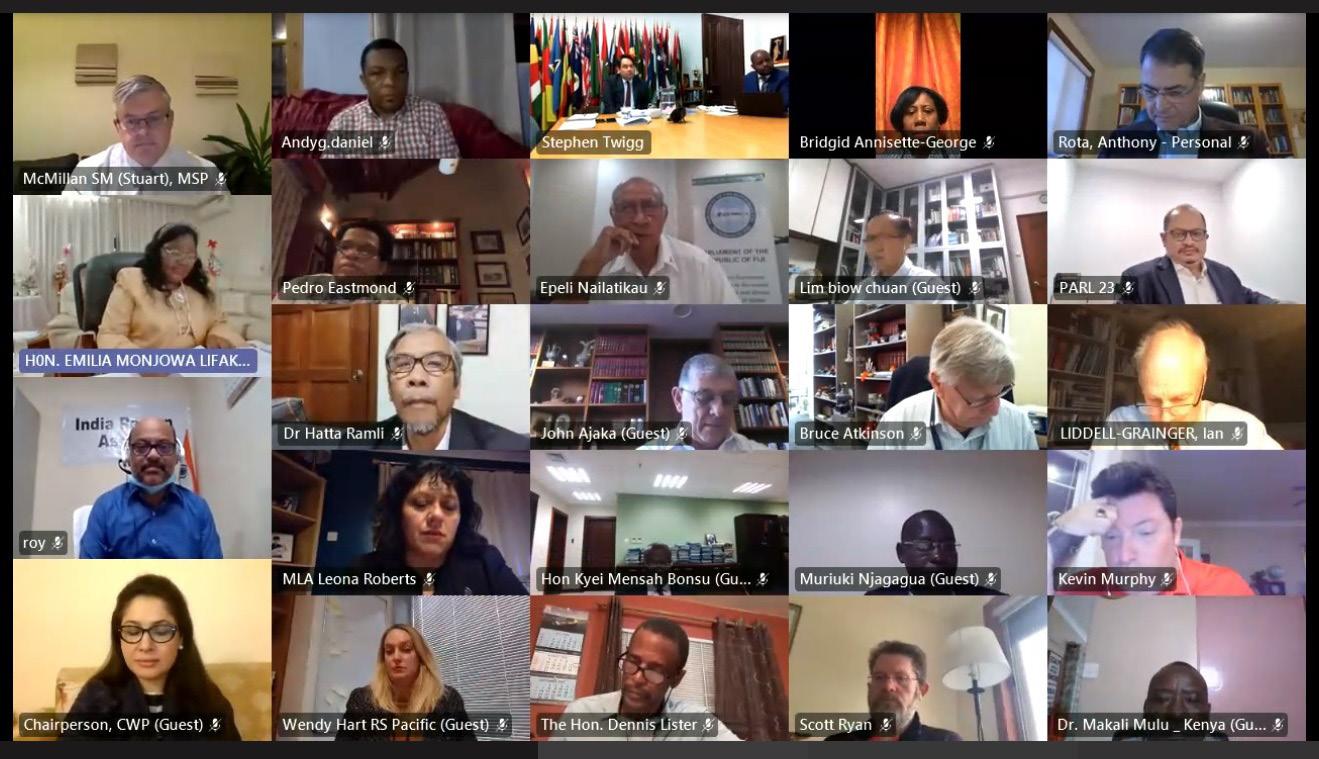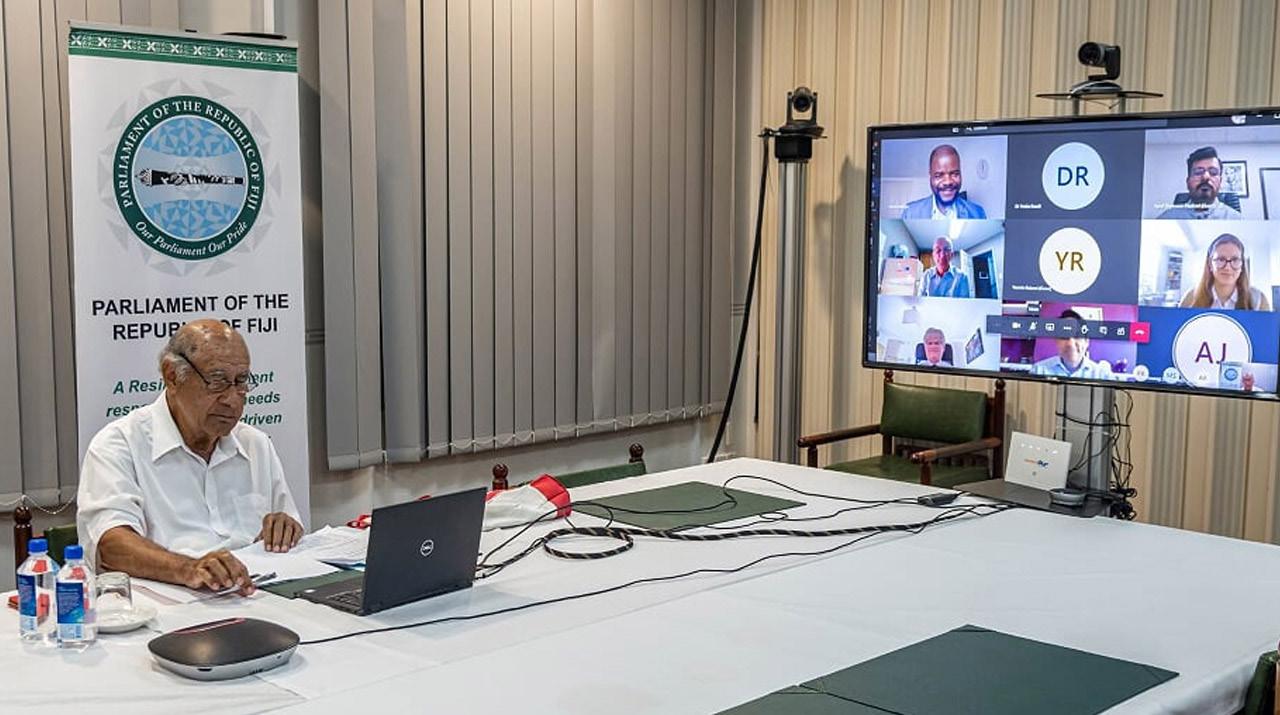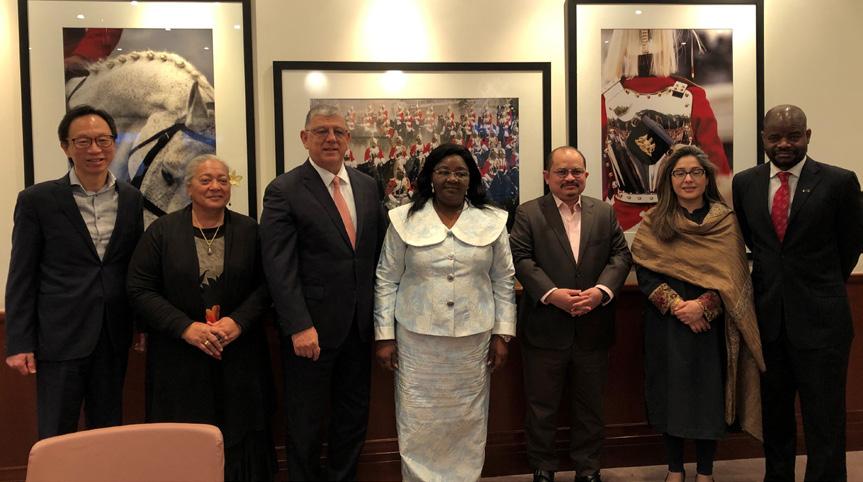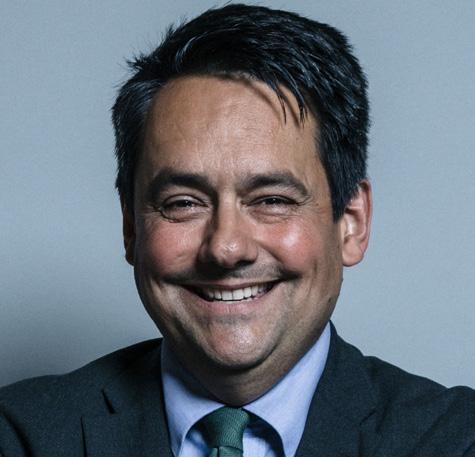
10 minute read
CPA Governance
Governance and Management
The General Assembly: The General Assembly has the ultimate constitutional authority to determine the policy and management of the Association. An annual ordinary meeting of the General Assembly is held at each plenary conference.
Executive Committee and Trustees: The CPA is run by an Executive Committee which acts as the board of trustees of the charity and determines its strategy and overall management. Day-to-day direction of the Association is vested in the Secretary-General, the Chief Executive Officer (CEO). The Executive Committee is responsible for the control and management of the Association’s affairs. It has three Subcommittees: Planning & Review Subcommittee; Finance Subcommittee and Performance & Review Subcommittee.
The Executive Committee is made up of 35 Members, who are also the Trustees of the Association. They are comprised of Members of all three Subcommittees. All Members of the Executive Committee serve a three-year term, with a third of the Members retiring each year. The Executive Committee normally meets twice a year and reports to the General Assembly annually. However, between 1 January and 31 December 2020, the Executive Committee and its Subcommittees met for a virtual meeting from 19 to 22 August 2020. The CPA Executive Committee and Secretary-General report to the annual General Assembly. The most recent General Assembly was held on 28 September 2020 in Kampala, Uganda.
Trustees are appointed by the Executive Committee on the basis of eligibility, specialist skills and availability, and all of our Trustees give their time freely. An induction session is organised by the Secretariat for new Trustees. New Trustees are also provided with recent data on the operations of the CPA, including financial reports and minutes of immediate past meetings. At their bi-annual meetings, Trustees are kept appraised of recent charity legislation/developments by the Senior Management Team (SMT) of the CPA Headquarters Secretariat.
Coordinating Committee: The Coordinating Committee is constitutionally composed of the Chairperson of the Executive Committee, the Vice-Chairperson of the Executive Committee, the Treasurer, the Chairperson of the Commonwealth Women Parliamentarians (CWP) and the CPA Small Branches Chairperson. The Coordinating Committee is responsible for overseeing the implementation of practices, policies and procedures of the Executive Committee between meetings, the follow-up on Executive Committee decisions, and for dealing with urgent and critical issues as may arise between Executive Committee meetings.
HOW IS THE CPA ORGANISED?
CPA General Assembly: Representing all CPA Branches at the annual Commonwealth Parliamentary Conference
CPA Executive Committee: CPA Officers and 35 Regional Representatives from all nine regions
CPA Co-ordinating Committee: CPA Chairperson; Vice-Chairperson; Treasurer; Small Branches Chairperson; Commonwealth Women Parliamentarians Chairperson
CPA Secretary-General & CPA Headquarters Secretariat
CPA Executive Committee Meetings in 2020
CPA EXECUTIVE COMMITTEE HOLD VIRTUAL MEETING TO ADDRESS KEY GOVERNANCE ISSUES FOR THE COMMONWEALTH PARLIAMENTARY ASSOCIATION
The CPA Executive Committee held its first fully virtual meeting from 19 to 22 August 2020 chaired by the Chairperson of the Executive Committee, Hon. Emilia Monjowa Lifaka, MP, Deputy Speaker of the National Assembly of Cameroon. The CPA Executive Committee represents the nine regions of the CPA - Africa; Asia; Australia; British Islands and Mediterranean; Canada; Caribbean, Americas and Atlantic; India; Pacific; South-East Asia. The CPA Executive Committee Mid-Year meeting was attended by representatives from all of the nine CPA Regions along with the Officers of the Association. The meeting was also the first CPA Executive Committee attended by the new SecretaryGeneral of the CPA, Stephen Twigg.
The Chairperson of the CPA Executive Committee said: “The Commonwealth Parliamentary Association (CPA) provides a unique platform for inter-parliamentary dialogue to take place amongst its membership of 180 Member Parliaments and Legislatures. The Commonwealth Parliamentary Association’s membership not only comprises national Parliaments of the Commonwealth, but also provincial, state and territorial Legislatures as well as devolved Assemblies. The diverse nature of the membership provides the Commonwealth Parliamentary Association with a unique position within the parliamentary community to offer a comprehensive perspective on how to strengthen parliamentary democracy Commonwealthwide and discuss new and innovative approaches on how to do so.”

The CPA Executive Committee Mid-Year meeting was due to have been held in April 2020 in Assam, India but had to be postponed due to COVID-19 global pandemic and travel restrictions in place.
Ahead of the CPA Executive Committee meetings, the CPA Chairperson and the CPA Secretary-General also met virtually with the CPA Regional Secretaries.
Left: The Speaker of the Parliament of Fiji and CPA Pacific Regional Representative, Hon. Ratu Epeli Nailatikau, MP participates in the virtual CPA Executive Committee meeting.
The Commonwealth Parliamentary Association held a meeting of the Officers of the Association on 18 and 19 January 2020 in London, UK. The meeting was chaired by Hon. Emilia Monjowa Lifaka, MP, Chairperson of the CPA Executive Committee and the Deputy Speaker of the National Assembly of Cameroon. Attendees included: Hon. John Ajaka, MLC, Vice-Chairperson of the CPA Executive Committee and President of the Legislative Council of New South Wales; Hon. Datuk Seri Shamsul Iskandar bin Mohd Akin, MP (Malaysia), CPA Treasurer; Hon. Shandana Gulzar Khan, MNA (Pakistan), Chairperson of the Commonwealth Women Parliamentarians (CWP); Hon. Niki Rattle, CPA Small Branches Chairperson and Speaker of the Parliament of the Cook Islands; Senator Yuen Paul Woo from Canada also attended the meeting to represent the CPA President.
CPA GOVERNANCE MEETING WITH CPA OFFICERS HELD AT START OF 2020

Day-to-Day Management: The CPA Secretary-General is supported in the day-to-day management of the CPA Headquarters Secretariat and the Association’s affairs by the Deputy Secretary-General and Director of Operations and the Finance Director. The CPA Secretary-General reports on the operations of the CPA Headquarters Secretariat directly to the CPA Chairperson and the CPA Executive Committee, and via the Co-ordinating Committee and the three Subcommittees. Decisions on daily operational matters are made by the CPA Secretary-General, in consultation with the Directors. The CPA Secretary-General, the Deputy Secretary-General and Director of Operations, the Finance Director, the Head of Parliamentary Development, the Head of the Secretary-General’s Office, the Head of IT Transformation and HR Consultant make up the Senior Management Team (SMT).
Risk Management: The Trustees are responsible for risk management. Risks identified by the Senior Management Team are reviewed, assessed and appropriate action incorporated as part of operational delivery. During 2020, the main risks and uncertainties facing the Association were: • restricted opportunities to grow or diversify income. • significant reliance on membership fees, and the timely payment of subscriptions. • the challenge of ensuring that membership remains a worthwhile proposition for the CPA’s Branches. • investment in the infra-structure that helps ensure the CPA Headquarters Secretariat is run efficiently and is pro-active in communications with its membership. • new or unexpected pressures on the CPA Headquarters Secretariat or Programme costs. • governance, given the CPA’s status as a UK Charity with both UK and international Trustees.
Appropriate systems and/or actions have been developed or undertaken to identify and mitigate risk. These systems or actions include: • expanding the Association’s revenue streams by reviewing its membership categories. • maximising the Association’s investment returns within an agreed risk appetite framework. • actively seeking hosts for the Association’s events to achieve a reduced cost burden on reserves. • financial governance-related policies (i.e. use of credit cards, funding policy to support branch programme delivery, cash handling, etc). • a programme of internal audit of the Association’s governance, risks, controls and performance management arrangements. • Audit Subcommittee oversight. • staff handbook detailing HR policies, practices and procedures. • business and financial risk management plan (risk register) which details the nature of risk (i.e. external, fraud, governance, operational, liquidity and security) likelihood of occurrence, controls in place and the risk holder. • appropriate insurance cover (management liability: Trustees’ liability, employment practices liability and legal liability; office cover: employer’s liability, public liability, business interruption, and office contents; health and life). • establishment of an expert group to consider options for longer term organisational status. The Trustees consider risk management as a top priority matter. The internal audit cycle in 2020 reviewed the effectiveness of the Association’s risk management processes and key controls. Following the review, steps will be taken to update/develop relevant policies and systems.
Compliance with UK Charity Commission Governance Code: The CPA Headquarters Secretariat recognised that a new Governance Code was introduced by the UK Charity Commission in July 2017 and has implemented and complied with this new code.
CPA STRATEGIC AND BUSINESS PLAN CONSULTATIONS
The previous CPA Strategic Plan for the Association runs from 2018 to 2021 and so in 2020, the CPA SecretaryGeneral and the CPA Headquarters Secretariat began a consultation process with all CPA Branches and Regions as well as over 100 external stakeholders to produce the next CPA Strategic Plan for 2022-2025.
The CPA Secretary-General emphasised the key role of building effective partnerships with Commonwealth organisations in achieving the organisation’s strategic goals. The new Strategic Plan will be presented to the CPA Executive Committee in March 2021 and will begin in 2022.

Corporate Effectiveness and Efficiency
Provision of Facilities for Member Branches The Trustees continued to make the CPA both accessible and welcoming to all Commonwealth countries who wish to enhance parliamentary democracy. In particular, we are committed to assisting Commonwealth countries that are less developed both financially and democratically. Our annual membership fee is structured to provide assistance to all CPA Branches by providing funding to assist their Parliamentarians to attend the CPA’s events.
CPA Staff & Secretariat Matters in 2020 In 2020, the staff at the CPA Headquarters Secretariat continued in their commitment to support the work of Parliamentarians and parliamentary staff in the Branches and Regions of the Association.
CPA Headquarters Secretariat have continued to benefit from Learning and Development (L&D) opportunities and training during the year. To that end, CPA Headquarters Secretariat staff members attended, amongst others: Prince2 Foundation Training; BOND courses on Monitoring and Evaluation and Budget Management; Senior Leadership and Management course.
The CPA Headquarters Secretariat recruited several new staff members in 2020 including the Secretary-General, Programmes Manager, Partnership & Engagement Manager, Executive Officer to the Secretary-General, Programmes Administrator (Parliamentary Academy) and Communications and Monitoring & Evaluation Administrator. The CPA Headquarters Secretariat also worked with the CPA New Zealand Branch to recruit a new Programmes Administrator based at the Parliament of New Zealand. CPA Headquarters Secretariat staff during 2020 are listed below: • Mr Stephen Twigg, Secretary-General (from 1 August 2020) • Mr Jarvis Matiya, Acting Secretary-General (until July 2020) then Deputy Secretary-General • Mr Paul Townley, Director of Finance • Mr Matthew Salik, Head of Parliamentary Development • Ms Emily Davies, Head of Private Office, Secretary-General’s Office • Mr Chinonso Orekie, Head of IT Transformation • Ms Sharon Moses, Human Resources Advisor • Mr Tuck Choo, Financial Accountant • Mr Jeffrey Hyland, Editor, The Parliamentarian and
Communications Manager • Ms Cynthia Appenteng, Partnership & Engagement Manager • Mr James Pinnell, Programmes Manager, Multilateral Engagement • Ms Lydia Buchanan, Programmes Manager, Bilateral Engagement • Ms Benite Dibateza, Programmes Officer and CWP Coordinator • Mr Jack Hardcastle, Programmes Officer and CPA Small
Branches Coordinator • Mr Clive Barker, Programmes Officer and CPwD Coordinator • Ms Colette Blair-Buchanan, Finance Officer • Ms Avni Kondhia, Executive Officer, Secretary-General’s Office • Ms Aqsa Latif, Programmes Administrator • Ms Acacia Wall, Programmes Administrator • Ms Olivia Flynn, Programmes Administrator (Parliamentary
Academy) • Mr Tom Davies, Communications and Monitoring & Evaluation
Administrator • Mrs Luseane Chesham, Office Administrator (part-time)
Former CPA staff during 2020: • Ms Anna Schuesterl, Programmes Manager • Mr Mohammed Aden, Programmes Administrator
NEW CPA SECRETARY-GENERAL APPOINTED IN 2020
In 2020, the CPA Executive Committee appointed a new Secretary-General for the Association, Stephen Twigg. The Chairperson of the CPA Executive Committee, Hon. Emilia Monjowa Lifaka, MP, said: “On behalf of the Commonwealth Parliamentary Association, we welcome the appointment of the new CPA Secretary-General, and the CPA Executive Committee and CPA Headquarters Secretariat look forward to working with Mr Stephen Twigg to further the work of the Association in parliamentary strengthening across the Commonwealth. His long-standing parliamentary experience will be valuable to the Association.”

The CPA Executive Committee approved the appointment of the new CPA Secretary-General, acting in the capacity of the General Assembly as mandated by the 64th General Assembly held in Kampala, Uganda on 28 September 2019. The new CPA Secretary-General took up his appointment from 1 August 2020 for a fixed term of four years. He is a former UK Parliamentarian, who was elected to the Parliament of the United Kingdom as a Member of Parliament from 1997 to 2005 (Enfield Southgate) and from 2010 to 2019 (Liverpool West Derby). During his parliamentary career, he held several senior positions including Chairperson of the International Development Select Committee, Minister for Schools and a range of Shadow Front Bench roles.

